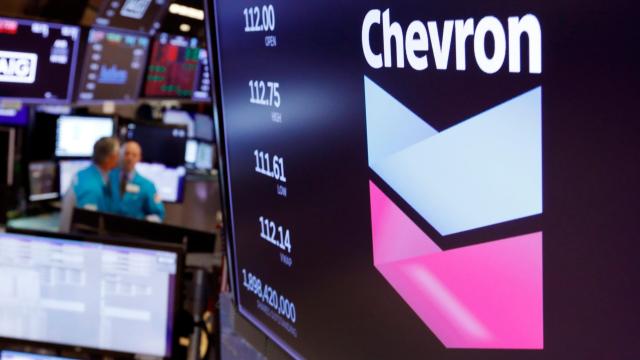In an interview with CNBC that aired Wednesday, Mike Wirth, the CEO of Chevron, said that it would not invest in renewable energy, instead allowing its shareholders to use money earned from the company and “let them plant trees.” Glad he came right out and said it!
The interview came on the heels of an investor meeting this week, where Wirth and other Chevron executives presented the company’s Energy Transition Spotlight, focusing on how Chevron says it’s investing more in energies that can help save the planet. Chevron is America’s biggest oil company, taking the title from Exxon last fall, and is the largest investor-owned source of global carbon emissions since 1965. If there’s any oil company that could benefit from turning over a greener leaf, it’s this one.
Wirth added a little Big Business context to his “let them eat cake” — sorry, “plant trees” — comments. “One of the things we’ve chosen not to go into is wind and solar,” Wirth continued in the CNBC interview. “These are technologies that are relatively mature. There is plenty of capital that’s available. The returns in wind and solar are actually being bid down, and we’ve concluded that management in our company can’t create value for shareholders by going into wind and solar.”
Again, this interview was airing on CNBC, so this might sound great to conscious investor types. If wind and solar are such a crowded space, why not invest in technologies that could help the planet and also need more investment? If you only pay attention to Chevron’s press releases about its investor meeting, it sounds like the company is really genuinely making an effort to change the types of energy it creates.
As CNBC reported, Chevron announced Tuesday it is “more than tripling its capital investment in its lower-carbon energy businesses,” pledging $US10 ($14) billion over the next 8 years to this section of the company, a hefty jump up from the $US3 ($4) billion earmarked before. Capitalism can save the planet, you guys!
But let’s poke this bear a bit, shall we? “Lower-carbon” is, first off, an interesting term. As journalist Amy Westervelt pointed out, it’s one of an increasing number of buzzwords Big Oil has started using to convince the general public that they’re working on this whole climate change thing — while hiding the fact that they’re continuing to produce products that drive up emissions. It’s a useless phrase that simply sounds nicer than “something that will fry the climate a little more slowly than what we’ve been doing for decades.”
Accordingly, Chevron’s Energy Transition presentation is heavy on the company’s investments in technologies that would drive down emissions in the production of oil and gas, which is kind of like switching to smoking light cigarettes when you’ve got lung disease. There’s also a whole section of the presentation devoted to carbon capture as well as hydrogen — two forms of expensive, early-stage technologies that look great on paper but have yet to be proven at scale aside from helping companies greenwash.
As Bloomberg chief energy correspondent Javier Blas pointed out on Twitter, all this investment in different technologies isn’t coming at the expense of fossil fuels. In fact, Chevron has announced it’s bumping up its overall capital expenditure through 2025, meaning it’s still spending billions in extracting even more oil and gas.
“The incremental investment in low carbon is NOT coming at the expense of lower spending in its traditional oil and gas business,” Blas wrote. “Think about have your cake and eat it.”
After all, $US10 ($14) billion over 8 years for a company that earned $US4.5 ($6) billion in the first 6 months of 2021 alone feels kind of like chump change.
In the investor meeting, Wirth introduced the new investment focus with comments that proclaimed “climate change is real” and that “human activity, including the use of fossil fuels, contributes to it.” In the same speech, however, he parroted recent oil industry talking points — which have also been the longtime favourite of climate denial groups — that energy (read: oil and gas) “enables modern life” and is “lift[ing] billions out of poverty.” (Wirth has previously said that he thinks population growth will keep fossil fuels in business for decades.)
Wirth also reaffirmed Chevron’s commitment to a carbon tax — the bare minimum policy that the whole industry is on board with, thanks to the fact that they’ve poisoned the conversation enough to make sure it never happens — while keeping his company from committing to any kind of net zero target.
Regardless of how Wirth and other executives may try to spin their company’s continued investment in fossil fuels as somehow cleaning up their act, the walls are starting to close in. Chevron’s new investment comes on the heels of a shareholder revolt this spring, when more than 60% of the company’s investors went against the recommendation of the Chevron leadership and voted to force it to account for the emissions caused by burning the oil it sells.
In March, a coalition of green groups filed an FTC complaint against Chevron, alleging that the company is misleading the public in its claims that it is working to reduce emissions. And on Thursday, the New York Times reported that the House Oversight Committee has called Chevron and other oil giants to testify before U.S. Congress as it investigates how the industry spread misinformation about the climate crisis. We’ll see if Wirth is still content with letting others plant trees after that.
